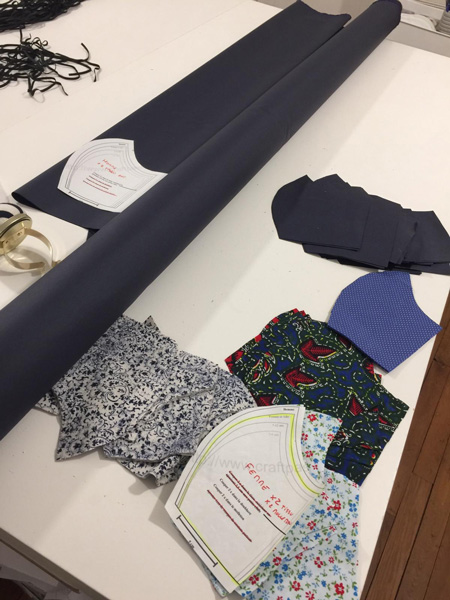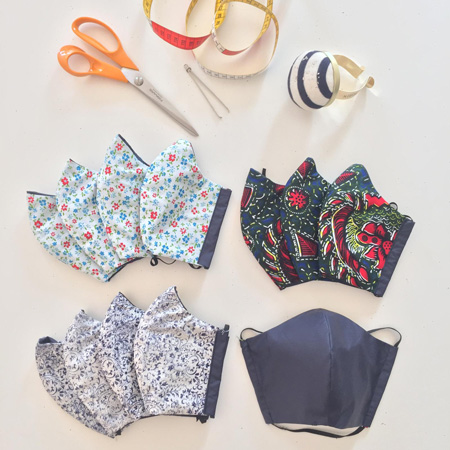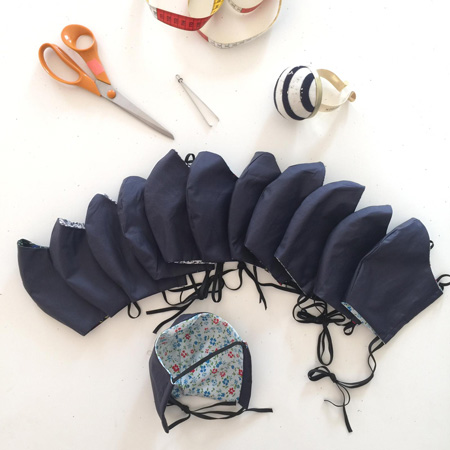DISCLAIMER: While the homemade fabric face masks are not as effective as surgical masks a lot of organisations (and even hospitals) are asking the sewing community for them as it could help in reducing the risk of respiratory viral transmission. Even when wearing a mask, wash you hands. Endorse social distancing and stay at home as much as possible. And whilst at home, maybe start sewing those masks… 🙂
Why this article?
We are living in very troubling times, sad times even. The home isolation asked by some governments is very difficult for a lot of people. Especially psychologically and economically. But let’s remember that despite how hard it is for those people to self-isolate, they’re still very lucky. Other people are battling to save lives and help less fortunate people. Those people are exposed to the risk of contamination and propagation of the virus.
The testimonies
Yesterday morning, on our family Whatsapp group, Blandine and I have received shocking texts from our cousins:
Firefighters
One of them is a firefighter. In addition to providing fire protection and rescue, the French fire service is also one of the providers of emergency medical services. As expected he’s told us that they transport people who have contracted Coronavirus a few times a day and after that, each time they have to bioclean the ambulance for more than an hour. But he also said that they aren’t allowed any contact with the outside, they cannot eat with colleagues anymore. Their families aren’t allowed at the fire station. He told us that the situation could evolved to a confinement at the barracks (without their partners nor children) if the situation worsens. No more deliveries, no more maintenance, no more sport activities except for running. Their job is to help the poorly first but in doing so at the moment they become very isolated themselves.
It’s a situation that I’m having a hard time imagining but it’s real. At least, for the moment they are equipped.

Funeral home employee
Another of our cousins, a single mum with 2 children, work at a funeral home. Unfortunately, they’ve had to deal with a first diseased person due to Coronavirus on Monday. I have learned that the body of a deceased person is still contagious. This also means that their immediate family members might be symptom-free carrier of the virus… Here is what she said:
“Deceased from coronavirus are put directly into a coffin and they’re not accepted in the funeral parlour, nothing. And it’s complicated to welcome the families. We don’t have equipment nor masks as we’re not caregivers or hospital staff. So we’re quite exposed too”.
I was shocked. First for the families of the deceased people who cannot say proper farewell to their loved ones but also for the people whom are exposed but are not given gears to face the virus.
Nursing homes are in need too
The mayor of the village I live in is a retirement home director. She contacted me as she is facing shortages of one-use masks for the non-medical staff. They use the masks to avoid infecting the residents in case they are symptom-free carriers. She’s asked me to sew 80 face masks. One for each person working there.
What can we do to help?
A lot is discussed those days, health, political, economical crisis… But all my energy is going towards the people who are helping on the ground and those who need our help.
First of all, if you have some stock of proper chirurgical face masks, donate them to your nearby hospital. But you might not be reading this page if that was the case. So, if like me, you feel like you could help your country and the people on the ground, you can do so by sewing face masks.

You can sew them first for yourselves and your loved ones and wear them when you go out food shopping for example. Maybe you even still need to go work?
But you can also answer the calls from hospitals who will be in need of those if they aren’t already. Call all your nearby funeral home, schools, retirement homes. Ask people around you if they need it. Propose your services on social media or on dedicated websites.
In the UK, The Big Community Sew website not only gives you access to patterns to sew face coverings for children and adults but it also lists a lot of local groups over the UK that have been (and are still) helping their communities sewing face masks and scrubs. Moreover, some contributors have done short videos to explain how to sew a face covering with or without a sewing machine.
In the past weeks on social media we’ve also seen the effort of thousands of Americans using #millionmaskchallenge and #MillionMaskMayday. It is already working but according to the Covid19 Masks website we’re far from fulfilling all the needs. You can also register on the Operation We Can Sew It website to propose your help. More than 40,000 face coverings have been distributed to health facilities already. Well done to them.
Those are for the UK and the US. We have not found any website or social media hashtags for Canada, Australia, New Zealand or any other country. If you have some, please share them with us by email or on Instagram and we’ll gladly update the article.
A little gesture from a sewist can help save lives down the line. So if you’re still wondering whether to make some or not, it’s important you do, so please get your sewing machine out and start sewing. 🙂
Sew a face mask
My intention was to create a pattern from scratch and post a tutorial but there’s a plethora of patterns already. Click the link below to access patterns from The Big Community Sew team.
Many thanks to The Big Community Sew for offering tutorials for everyone to make.

A textile engineer’s opinion on face masks
Bérangère from the blog Couture Et Paillettes whom is a textile engineer specialising in medical fabrics and biomaterials has written a very well explained blog post about face masks and their place in preventing the spread of Coronavirus. If you speak a little French, I would definitely recommend you read it. If you do not read French, here are the essential points she makes :
- fabric face masks aren’t for medical staff in contact with the virus to wear
- fabric face masks help reduce risks of transmission: less contact between hands and face
- fabric face masks are good to avoid contaminating others
- fabric face masks are great for social distancing: if you are seen wearing a face mask you can be sure no one is going to come close
- it is better to make them using cotton for comfort and breathability
- it is good to be able to add a casing to insert a “filter” type fabric
- the efficiency of a filter is not due to its thickness. Electrostatic dusting cloth are a good alternative
- even with fabric face masks you need to wash your hands and adhere to physical distancing
- to be efficient, a fabric face mask needs to be worn from the top of the nose to underneath the chin
- before putting on your mask, wash your hands and don’t touch the mask once you wear it
Those masks will not replace the surgical masks that are used by medical staff in hospitals but will help reduce the risk of contamination as mentioned by her and also by a doctor in an article by France 3:
“The face masks made in fabric will obviously not be certified by any official organisation but it can help block respiratory droplets produced when an infected person coughs or sneezes. It’s better than nothing!”.

And it can also help avoiding shortage of chirurgical masks for medical staff as mentioned by the hospital of Saint-Brieuc on their Facebook page:
“We need your help to create face masks for non-medical staffs and therefore preserve the stock of surgical masks for the medical staff.”
Thank you very much to everyone who will support those who need it.
Stay safe and take good care of each other.
Marie-Emilienne
Adults and Children’s face covering sewing patterns:
We link to the bigcommunitysew.co.uk website for you to find patterns to make your own face covering.
